This series of articles will celebrate (or laugh at) some of the worst professional sports teams of all time. I will focus on teams within my lifetime so expect the worst from the 1970s to present day.
1976 was a special year for the city of Montreal. The Summer Olympics came to the city, marking the first time the Olympiad would be hosted by a Canadian city. The city’s beloved hockey team, the Montreal Canadiens resumed their dominance of the National Hockey League, winning the first of their four consecutive Stanley Cups in 1976. Finally, Montreal was still considered Canada’s largest city in 1976, but was soon usurped by Toronto.
But if there was a blight to the largest French-speaking city outside of Paris, it was their baseball team. The Montreal Expos were horrid that season finishing with a record of 55-107, 46 games behind the first place Philadelphia Phillies.
What made this even worse was that there were high expectations for the Expos that season. Some were expecting the team to finish over .500 for the first time in franchise history. With new manager Karl Kuehl replacing Gene Mauch, the Expos were ready to take the next step. Instead they tripped and fell down hard.
The Expos had many problems in 1976. They were last in runs scored, (531) last in hits, (1,275) last in RBIs, (507) and last in ERA (3.99). In other words, they couldn’t score, couldn’t hit, couldn’t hit with runners in scoring position and couldn’t pitch. Other than that, everything was fine.
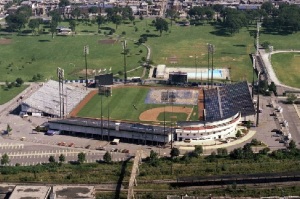
Jarry Park was the first home of the Expos in Montreal. Note the swimming pool past the right field fence. Other than that, not much of a home.
The offense wasn’t helped that the Jarry Park, the Expos home field at the time, was considered a pitcher friendly park. The left and right field foul poles were 340 feet from home plate while a home run to centre field had to travel at least 420 feet. So it is surprising that the Expos weren’t last in home runs, but they didn’t have one particular player that scared an opposing pitcher either.
Third baseman Larry Parrish led the team with a mere 11 home runs and 61 RBIs. Parrish did see his numbers suffer, thanks to the large dimensions of his home park.
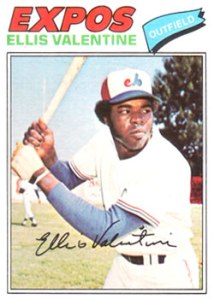
Ellis Valentine had all the tools to be a superstar. But he broke many hearts including his own throughout his career.
Rookie centre fielder Ellis Valentine showed glimpses of his ability, hitting .279 with 7 homers and 39 RBIs, while showing off a tremendous throwing arm from centre field. Valentine was expected to be the future superstar for the Expos franchise, but battles with substance abuse, injuries and erratic behaviour derailed his career.
Gary Carter went through the dreaded sophomore jinx. After a solid rookie season in which he batted .270 with 17 home runs and 68 RBIs, “The Kid” hit a wall in 1976, batting .219 with only 6 homers and 38 RBIs. Carter battled various injuries as well, which hindered his development and hurt the team
.
In fact, injuries decimated the Expos outfield in 1976. (Carter played right field before switching to catcher in 1977.) Only one outfielder played over 100 games in 1976. Jerry White played in 114 games but his light-hitting ways were a detriment to the club. Valentine appeared in 94 games. Pepe Mangual was a part of 66 games. Del Unser saw action in 69 games. Bombo Rivera appeared in 68 games. Jim Dwyer was on the field 50 times. The Expos outfield could have been used as extras on M*A*S*H instead of a being on a baseball field.
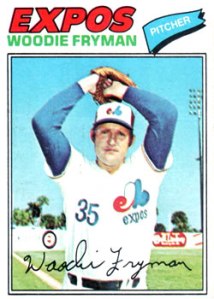
Woodie Fryman felt like he left the frying pan, and stepped into the fire whenever his turn in the rotation came up.
Then there was the pitching. The Expos battery of arms were battered and bashed around in 1976. Steve Rogers led the team with a 3.21 ERA and 150 strikeouts but still lost 17 games. Woodie Fryman was the only starting pitcher that did not have a losing record, (13-13) yet he surrendered 14 home runs, the most of any Expo pitcher. The rest of the staff, Don Stanhouse, Don Carrithers, Dan Warthen and Clay Kirby will live on as some of the most forgettable players in baseball history.
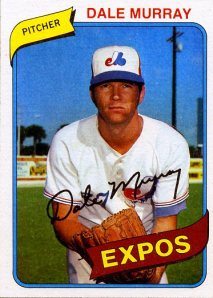
Dale Murray was overworked in 1976. But he is rocking that great Expos jersey so that counts for something.
Dale Murray did record 13 saves which led the club. He also led the club with 8 blown saves. That equals a 62% save percentage. A reliable closer he was not. Part of that problem was that Murray was overworked as well. He led the majors with 81 appearances for a pitcher. Added to that Murray appeared in 113.1 innings. Granted, closers appeared in more innings back in the day, usually needing to pitch 2-3 innings to record the save. However, an overuse of a pitcher does nothing but harm the team. Lack of depth in the bullpen plus poor starts by the rotation led to Murray being overused and worn out.
I mentioned earlier that Montreal hosted the 1976 Summer Olympics. While the Olympics provided great thrills (and even greater debt) to the city, it served as a distraction to the Expos. Surprisingly, the Expos did play home games during the Olympics but saw the crowds decline thanks to all the other events that surround the Olympics.
On July 18, the first full day of competition of the Olympics, the Expos hosted a doubleheader against the Houston Astros. Only 11,641 people bothered to show up at Jarry Park that Sunday afternoon. The Expos lost the first game 7-6 then were simply destroyed by the Astros 14-1.
With a team this bad, someone had to pay the price. That man was Kuehl who was fired after compiling a 43-85 record. Charlie Fox replaced Kuehl for the final month of the season and the Expos went 12-22 under Fox to close up the season. Fox was let go and replaced by Dick Williams in time for the 1977 season.
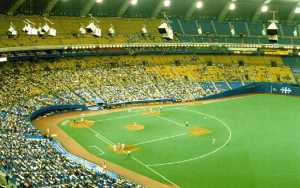
Olympic Stadium in its baseball state. Surprising there are no falling pieces of concrete in this picture.
The Expos did bid farewell to Jarry Park following the 1976 season and moved to the space age Olympic Stadium in 1977. The likes of Andre Dawson and Warren Cromartie rose up from the minors and made major contributions. Veteran Tony Perez came over from Cincinnati and provided leadership. The Expos continued their rise all the way to their only playoff appearance in 1981, five years after posting the worst record in baseball. But the good times didn’t last. The Expos faltered following the 1981 season. The Olympic Stadium, once considered modern was crumbling after many botched renovations. The fans stopped showing up. Even a brief glimpse of glory in the 1994 season was wiped out thanks to the strike that wiped out the World Series that year. The Expos had the best record in baseball when greed triumphed over the sport. 2004 was the last year of baseball in Montreal. The franchise relocated to Washington, D.C, and were christened the Nationals in time for the 2005 season. Sacre bleu!
You can follow me on Twitter @jstar1973

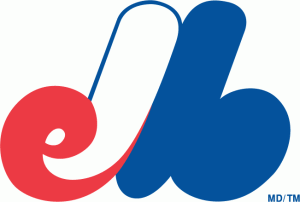
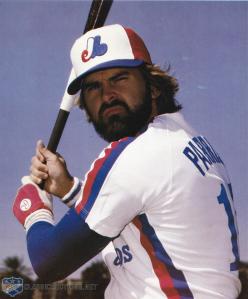
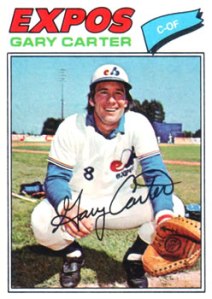
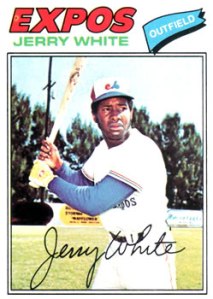
Reblogged this on We Talkin' Sports Here! and commented:
Add yoLove this article. LMAO! I remember the Expos (now the Nationals) and how bad they were. In my opinion, it was management that was the problem because they always had talent on the field. Maybe not a complete team of talented players but they had great players throughout their history. Though they had some heralded veterans that already made a name for themselves, they were considered an advanced farm system at the major league level that produced great talent.
Just to name drop a few that went on to have strong if not great careers (mostly for other teams)….
Andre Dawson – Was one of the few that played in Montreal for many years. He spent his first 11 years with the Expos before going to the Cubs for the next six. Also played two seasons with Boston and Florida before retiring after a great 21-year career (no championship).
Gary Carter – Another HOF player that played with the Expos for his first 11 years before getting shipped off to the New York Mets. He was able to win a World Series Championship with the Mets in 1986, in the unforgetable series against the Red Sox where Bill Buckner botched the grounder to first base.
Tim Raines – Had many of his best years (12) with the Expos but is still better known for his days with the New York Yankees where he won two World Series Championships.
Andres Galarraga – Spent his first 7 years with Montreal before going to Colorado. He is best known for his days in Colorado and Atlanta, specifically 1994-1998 where he hit 31 or more homeruns including three years in a row of 41+ homeruns.
Marquis Grissom – Had many great years in Montreal but it was not until he was sent to Atlanta that he made his mark in the mid/late 90’s with the great Atlanta Braves teams that competed for glory on an annual basis, including a World Series Championship in 1995.
Pedro Martinez – Pedro actually did not start off with Montreal, he came over from the Los Angeles Dodgers in a trade (for Delino DeShields) and had three average years. On his fourth year, however, he came into his own. He went 17-8 with a 1.90 ERA including 13 complete games and 4 shutouts. It was also his first Cy Young award. After the season, he was moved to Boston where he played for seven years and, though he played for other teams before retiring, it was his mark on the Boston Red Sox team that will be remembered. He went on to have a HOF career which included eight All Star appearances, three Cy Youngs Awards (7 nominations) and a World Series Championship in 2004 with Boston. This was the year that they beat the Yankees and lifted the dreaded “Bambino Curse”. But for me, he will always be remembered as the player that threw a 72-year old man to the ground. During a bench clearing brawl between the Redsox and Yankees (during 2003 ALCS), bench coach Don Zimmer was so upset with the Sox’s Pedro Martinez’s head hunting that he charged right at the pitcher, and Pedro threw Zimmer to the ground.
Larry Walker – Had six solid years with Montreal before moving on to Colorado where he had his best years. Some can say it was Colorado which inflated his number, others could mention PEDs/Juiced era, but he did win an MVP with the Rockies.
Vladmir Guerroro – Had eight great years for the Expos and put up big homerun numbers. He did however have great years with the ANA/LAA Angels where he won an MVP.
Tim Wallach – One of the era’s forgotten talents, Wallach (Expos 1st round pick in 1979) earned five All-Star berths and four Gold Gloves during his 13 years in Montreal, where he remains the franchise’s career leader in games played (1,767), at-bats (6,529), hits (1,694), total bases (2,728) and doubles (360).
Dennis Martinez – Martinez’s career sparkled upon donning an Expos uniform after spending his first ten seasons with Baltimore, capturing 100 wins while recording a solid 3.06 ERA in his eight seasons up north. Though his stay with Baltimore was shaky where he had mostly below average stats, he did have a strong season in 1981 where he went 14-5 with a 3.32 ERA. Also, he won a World Series Championship with Baltimore in 1983 even though he did not contribute during the postseason.
great article. It is amazing how many great players played in Montreal that are always going to be known for what they did after leaving the Montreal Expos! I always thought of them as a Farm System that was in the Major Leagues, they just developed the talent and then traded them away once they got good because they could not pay the high contracts… Reminds me of Billy Beane and the A’s!
Fond memories of watching Phillies games on the tube when they played the Expos at Jarry. Loved that swimming pool! A guilty pleasure of a ball field in comparison with all the cookie-cutter, fully enclosed bowls teams played in elsewhere, including the Vet in Philly. I attended those Montreal Olympics in ’76 but did not have a chance to see the ballpark while there. Wished I had.